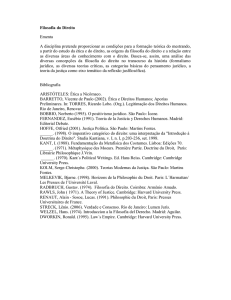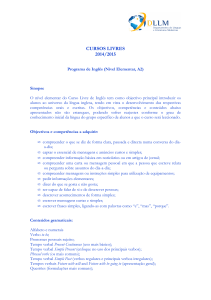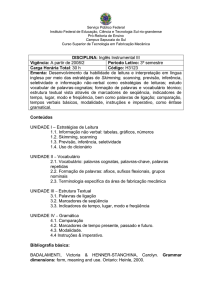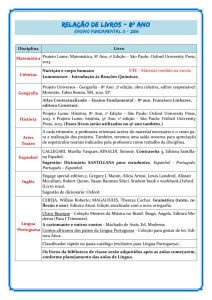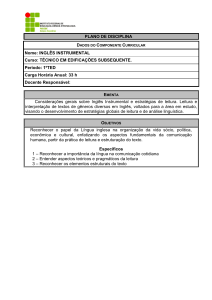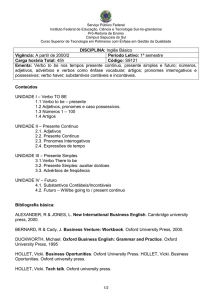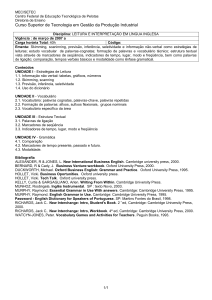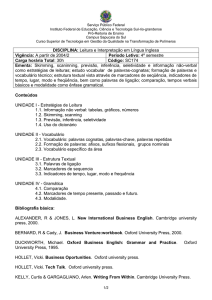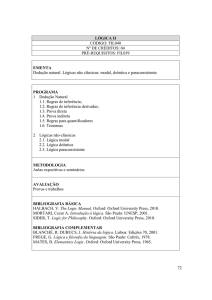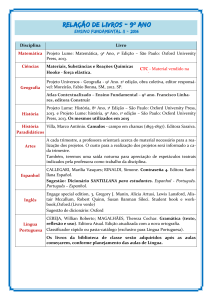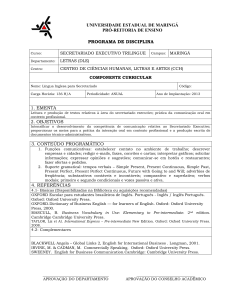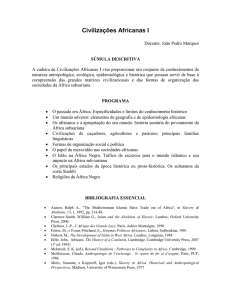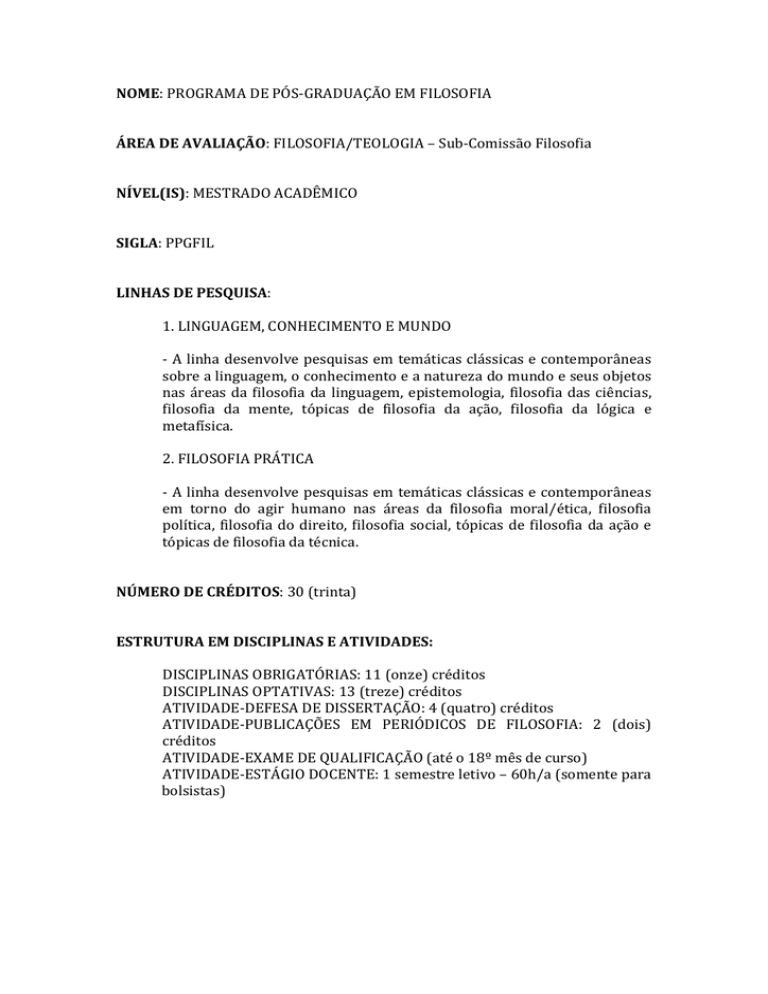
NOME: PROGRAMA DE PÓS-GRADUAÇÃO EM FILOSOFIA
ÁREA DE AVALIAÇÃO: FILOSOFIA/TEOLOGIA – Sub-Comissão Filosofia
NÍVEL(IS): MESTRADO ACADÊMICO
SIGLA: PPGFIL
LINHAS DE PESQUISA:
1. LINGUAGEM, CONHECIMENTO E MUNDO
- A linha desenvolve pesquisas em temáticas clássicas e contemporâneas
sobre a linguagem, o conhecimento e a natureza do mundo e seus objetos
nas áreas da filosofia da linguagem, epistemologia, filosofia das ciências,
filosofia da mente, tópicas de filosofia da ação, filosofia da lógica e
metafísica.
2. FILOSOFIA PRÁTICA
- A linha desenvolve pesquisas em temáticas clássicas e contemporâneas
em torno do agir humano nas áreas da filosofia moral/ética, filosofia
política, filosofia do direito, filosofia social, tópicas de filosofia da ação e
tópicas de filosofia da técnica.
NÚMERO DE CRÉDITOS: 30 (trinta)
ESTRUTURA EM DISCIPLINAS E ATIVIDADES:
DISCIPLINAS OBRIGATÓRIAS: 11 (onze) créditos
DISCIPLINAS OPTATIVAS: 13 (treze) créditos
ATIVIDADE-DEFESA DE DISSERTAÇÃO: 4 (quatro) créditos
ATIVIDADE-PUBLICAÇÕES EM PERIÓDICOS DE FILOSOFIA: 2 (dois)
créditos
ATIVIDADE-EXAME DE QUALIFICAÇÃO (até o 18º mês de curso)
ATIVIDADE-ESTÁGIO DOCENTE: 1 semestre letivo – 60h/a (somente para
bolsistas)
DISCIPLINAS OBRIGATÓRIAS
Linha de Pesquisa Linguagem, conhecimento e mundo:
1. Filosofia da Linguagem – 45h
Ementa: Visão geral das discussões contemporâneas na área de filosofia da
linguagem, sem fixar-se em um autor particular, buscando provocar o diálogo
entre tradições filosóficas como, por exemplo, a hermenêutica continental e a
filosofia analítica anglo-americana.
Referência Bibliográfica:
D’AGOSTINI, F. Analíticos e Continentais. Guia à filosofia dos últimos trinta anos.
[1997] Trad. Benno Dischinger. São Leopoldo: Editora Unisinos, 2002.
DAVIDSON, D. Inquiries into Truth and Interpretation. Oxford: Oxford University
Press, 1984.
DAVIDSON, D. Problems of rationality. Oxford: Clarendon Press, 2004.
FODOR, J. A. The Language of Thought. Hassocks, Essex, and Scantron, PA:
Harvest Press e Crowell, 1975.
FREGE, G. The Frege Reader. org. Michael Beaney. Oxford: Blackwell, 1997.
FREGE, G. The Intentions of Intentionality and others Models for Modalities. Reidel:
Dordrecht, 1975.
HEIDEGGER, M. On the Way to Language. New York: Harper & Row, 1971.
HILEY, D. R.; BOHMAN, J.; SHUSTERMAN, R. (eds). The Interpretive Turn:
Philosophy, Science, Culture. Ithaca: Cornell University Press, 1992.
HINTIKKA, J. Knowledge and Belief. Ithaca: Cornell University Press, 1962
KRIPKE, S. Naming and Necessity. Cambridge-Mass: Harvard University Press,
1972.
LAFONT, C. Heidegger, Language and World-Disclosure. Cambridge: Cambridge
University Press, 2000.
LAFONT, C. The Linguistic Turn in Hermeneutics. Cambridge, Mass.: MIT Press,
2002.
LAURIER, D. Introduction à la Philosophie du langage. Liège: P. Mardaga, 1993.
MARTINICH, A. P. The Philosophy of Language. Oxford: Oxford University Press,
1985.
MCDOWELL, J., Meaning, Knowledge and Reality. Cambridge-Mass.: Harvard
University Press, 2001.
MCDOWELL, J. Mind and World. Cambridge: Harvard University Press, 1996.
MEYER, M. (dir.). La philosophie anglo saxone. Paris: PUF, 1994.
MORRIS, C. Signification and Significance: a Study of the Relations of Signs and
Values. Cambridge: MIT Press, 1970.
PUTNAM, H. Mind, Language and Reality. Cambridge: Cambridge University
Press, 1975.
QUINE, W. The Roots of Reference. La Salle, Il.: Open Court, 1974.
QUINE, W. Word and Object. Cambridge: The MIT Press, 1960.
QUINE,W. Pursuit of Truth. Cambridge: Harvard University Press, 1990.
RAJCHMAN, J.; WEST, C. (Eds). Post-Analytic Philosophy. New York: Columbia
University Press, 1985.
RUSSELL, B. The Problems of Philosophy. Oxford: Oxford University Press, 1980,
1.ed. 1912.
RORTY, R. Philosophy and the Mirror of Nature. Princeton: Princeton University
Press, 1979.
SEARLE, J. Speech Acts. Cambridge: Cambridge University Press, 1968.
VON WRIGHT, G. H. Explanation and Understanding. Ithaca, N.Y.: New York
University Press, 1971.
WITTGENSTEIN, L. Tractatus logico-philosophicus. Londres: Routledge, 1961.
WITTGENSTEIN, L. Philosophical Investigation. Oxford: Blackwell, 1967.
2. Metafísica – 45h
Ementa: Visão geral das discussões contemporâneas na área da metafísica, sem
fixar-se em um autor particular, evidenciando o debate existente, por exemplo,
tanto na hermenêutica continental quanto na filosofia analítica anglo-americana.
Referência Bibliográfica:
ARMOUR-GARB, B., BEALL, J. C., PRIEST, G. (eds.) The law of non-contradiction. Oxford:
Clarendon, 2005.
ARMSTRONG, D. M. Truth and truthmakers. Cambridge: Cambridge UP, 2004.
__________. A world of states of affairs. Cambridge: Cambridge, 1997.
__________. Universals and scientific realism, vol 1 e 2. Cambridge: Cambridge UP, 1978.
BACON, J. The alphabet of being. Cambridge: Blackwell, 1995.
BOËR, S. E. Tought content: the ontology of belief and the semantics of belief attribution.
Dordrecht: Springer, 2007.
CHISHOLM, R. M. On Metaphysics. Minneapolis, University of Minnesota Press, 1989.
_____. A realistic theory of categories: an essay on Ontology. Cambridge, Cambridge UP,
1996.
COCCHIARELLA, N. B. Logical investigations of predication theory and the problem of
universals. Napoli, Bibliopolis, 1986.
D’AGOSTINI, F. Analíticos e Continentais. Guia à filosofia dos últimos trinta anos.
[1997] Trad. Benno Dischinger. São Leopoldo: Editora Unisinos, 2002.
GADAMER, H.-G. Wahrheit und Methode: Grundzüge einer philosophischen
Hermeneutik. Tübingen, Mohr, 1990.
_____. Wahrheit und Methode: Ergänzungen, Register. Tübingen, Mohr, 1990.
GREISCH, J. L’Âge herméneutique de la raison. Paris, Cerf, 1985.
HEIDEGGER, M. Kant und das Problem der Metaphysik. Frankfurt am Main, Klostermann,
1973.
_____. Vorträge und Aufsätze. Tübingen, Günther, 1954.
_____. Holzwege. Frankfurt am Main, Klostermann, 1950.
_____. Ontologie (Hermeneutik der Faktizität), Gesamtausgabe, Band 63, V. Klostermann,
Frankfurt am Main, 1988.
_____. Introduction to Metaphysics. 2nd ed. Yale, Yale University Press, 2014.
_____. Being and Time. New York, SUNY Press, 2010.
HUSSERL, E. Die Idee der Phänomenologie. – Haag: M. Nijhoff, Husserliana, Bd. II, 1973.
_____. Ideen zu Einer Reiner Phänomenologie und Phänomenologischer Philosophie. Drittes
Buch. – Haag: M. Nijhoff, 1971 (Husserliana – Bd. V).
_____. Erste Philosophie. – Haag: Martinius Nijhoff, 1956, (Husserliana, Bd. VII).
INWAGEN, P. van. Metaphysics. 4a ed. Westview Press, 2014.
_____ & ZIMMERMAN, D. W. (eds). Metaphysics and the big questions. WilleyBlackwell, 1998.
_____. An essay on free will. Oxford University Press, 1986.
LEWIS, D. On the plurality of worlds. Oxford, Blackwell, 1986.
KIM, J.; KORMAN, D.Z.; SOSA, E. (Eds). Metaphysics: an anthology. WileyBlackwell, 2011.
KANE, R. (ed). The oxford handbook of free will. Oxford, OUP, 2011.
LEWIS, D. Papers in Metaphysics and Epistemology. 2 vols. Cambridge:
Cambridge University Press, 1999.
LOWEE, E.J. A survey of metaphysics. Oxford, OUP, 2002.
LOUX, Michael. Metaphysics: a contemporary introduction. London, Routledge, 2006.
_____. Metaphysics: contemporary readings. London, Routledge, 2007.
_____ & ZIMMERMAN, D. (eds). The oxford handbook of metaphysics. Oxford, OUP, 2005.
MEINONG, A. Über Gegenstandstheorie; Selbstdarstellung. Hamburg, Felix Meiner, 1988.
NEALE, S. Descriptions. Cambridge, MIT Press, 1990.
PARSONS, T. Nonexistent objects. New Haven, Yale UP, 1980.
PROUST, J. Questions de forme: Logique et proposition analytique de Kant à Carnap. Paris,
Fayard, 1986.
QUINE, W. V. O. Ontological relativity & other essays. New York, Columbia UP, 1969.
_____. Theories and things. Cambridge, Belknap, 1981.
STRAWSON, P. F. Individuals: an essay in descriptive metaphysics. London, Methuen,
1971.
_____. Analyse et Metaphysique. Paris, J. Vrin, 1985.
_____. Ensayos lógico-lingüísticos. Madrid, Tecnos, 1983.
_____. Entity and identity, and others essays. Clarendon Pr., 1997.
SIDER, T. Contemporary debate in metaphysics. Wiley-Blackwell, 2007.
TARSKI, A. Logic, semantics, metamathematics. Ed. by J. Corcoran, and transl. by
J.H.Woodger. 2.ed. Indianapolis, Hackett, 1983.
ZALTA, Ed. N. Abstract object. Dordrecht, D. Reidel, 1983.
WATSON, G. Free will. Oxford, OUP, 2003.
3. Epistemologia – 45 h
Ementa: Visão geral das discussões contemporâneas nas áreas da
epistemologia/teoria do conhecimento e filosofia das ciências, sem fixar-se em
um autor particular, evidenciando o debate existente, por exemplo, tanto na
hermenêutica continental quanto na filosofia analítica anglo-americana
Referência Bibliográfica:
BONJOUR, L. The Structure of Empirical Knowledge. Cambridge-Mass.: Harvard
University Press, 1985.
CHISHOLM, R. The Foundations of Knowing. Minneapolis: University of Minnesota
Press, 1982.
CHISHOLM, R. Theory of Knowledge. 3a. ed. Englewood Cliffs: Prentice-Hall, 1989.
CRAIG, E. (ed). Routledge Encyclopedia of Philosophy. 10 Vol. Londres: Routledge,
2001.
DANCY, J. Normativity. Oxford: Blackwell, 2000.
D’AGOSTINI, F. Analíticos e Continentais. Guia à filosofia dos últimos trinta anos.
[1997] Trad. Benno Dischinger. São Leopoldo: Editora Unisinos, 2002.
DUMMETT, M. A. Origins of Analytic Philosophy. Cambridge: Harvard University
Press, 1994.
GRECO, J.; SOSA, E. (dir). The Blackwell Guide to Epistemology. Oxford: Blackwell,
1998.
GOLDMAN, A.I. Epistemology and Cognition. Cambridge: Harvard University
Press, 1986.
GRICE, P. Aspects of Reason. Oxford: Oxford University Press, 2001.
HACKING, I. Representing and Intervening. Cambridge: Cambridge University
Press, 1983.
HILEY, D. R.; BOHMAN, J.; SHUSTERMAN, R. (eds). The Interpretive Turn:
Philosophy, Science, Culture. Ithaca: Cornell University Press, 1992.
HONDERICH, T.; et al. The Oxford Companion to Philosophy. Oxford, New York:
Oxford University Press, 1995
KIRKHAM, R. L. Theories of Truth. Cambridge: MIT Press, 1992.
LEHRER, K. Theory of Knowledge. 2a ed. Boulder: Westview Press, 2000.
Moser, P. K. (dir). The Oxford Handbook of Epistemology, Oxford, Oxford U. Press,
2002.
POLLOCK, J. Contemporary Theories of Knowledge. Lanham: Rowman and
Littlefield, 1986.
POPPER, K. The Logic of Scientific Discovery. Londres: Hutchinson, 1959.
PUTNAM, H. Reason, Truth and History. Cambridge: Cambridge University, 1981.
RAJCHMAN, J. & WEST, C. (eds). Post-Analytic Philosophy. New York: Columbia
University Press, 1985.
RICHARDSON, John. Existential Epistemology: A Heideggerian Critique of the
Cartesian Project. Oxford: Clarendon Press, 1986.
RICOEUR, P.; THOMPSON, J. B. Hermeneutics and the Human Sciences. Essays on
Language, Action and Interpretation. Cambridge: Cambridge University Press;
Paris: Editions de la Maison des sciences de l’homme, 1981.
RICOUER, P. Du texte à l'action. Essais d'herméneutiqueII. Paris: Seuil, 1986.
RORTY, R. Philosophy and the Mirror of Nature. Princeton: Princeton University
Press, 1979.
SHAPIN, Steven. A social history of truth. Chicago: Chicago University Press, 1993.
SOSA, E.; KIM, J. (dir.) Epistemology: An Anthology. Oxford: Blackwell, 1999.
STEUP, M.; SOSA, E. (dir.). Contemporary Debates in Epistemology. Oxford:
Blackwell,2001,
Linha de Pesquisa Filosofia Prática:
1. Ética – 45h
Ementa: Visão geral das discussões contemporâneas na área da Ética normativa,
buscando provocar o diálogo entre tradições filosóficas como, por exemplo, a
hermenêutica continental e a filosofia analítica anglo-americana.
Referência Bibliográfica:
ANSCOMBE, G. E. M. Modern Moral Philosophy. Philosophy. 33, 1958, p.1-19.
CLARKE, S. G.; SIMPSON, E. (Eds). Anti-Theory in Ethics and Moral Conservatism.
New York: State University of New York Press, 1989.
CANTO-SPERBER, Monique. Éthiques d'Aujourd'hui. Paris, PUF, 2004.
_____ & ROWEN, Ogien. Que devo fazer? Uma introdução à filosofia moral. São
Leopoldo, Editora Unisinos, 2004.
D’AGOSTINI, F. Analíticos e Continentais. Guia à filosofia dos últimos trinta anos.
[1997] Trad. Benno Dischinger. São Leopoldo: Editora Unisinos, 2002.
FURROW, D. Against Theory. Continental and Analytic Challenges in Moral
Philosophy. New York/Londres: Routledge, 1995.
HILEY, D. R.; BOHMAN, J.; SHUSTERMAN, R. (eds). The Interpretive Turn:
Philosophy, Science, Culture. Ithaca: Cornell University Press, 1992.
HOLLINGER, R. (Ed). Hermeneutics and Praxis. Notre Dame: University of Notre
Dame Press, 1985.
JAMIESON, Dale (org.). A Companion to Environmental Philosophy. Malden/
Massachusetts: Blackwell Publishers Inc., 2001.
KUHSE, H & SINGER, Peter (org.). A Companion to Bioethics. Malden/Mass.:
Blackwell Publishers, Inc. 2000.
LAFOLLETTE, H. (Ed.). The Blackwell Guide to Ethical Theory. Oxford: Blackwell
Publishers, 2000.
OLIVEIRA, Manfredo A. de. (ed). Correntes fundamentais da ética contemporânea.
Petrópolis, Vozes, 2000.
REGAN, Tom. The Case for animals Rights. Berkeley/LA: University of Califórnia
Press, 1983.
ROWEN, O. L’Éthique Aujourd’hui. Maximalistes et minimalistes. Paris, Gallimard,
2007.
SIMPSON, E. (ed). Antifoundationalism and Practical Reasoning. Conversations
between Hermeneutics and Analysis. Edmonton: Academic Print. & Pub., 1987.
SINGER, P. (Ed.). A Companion to Ethics. Oxford: Blackwell Publishers, 1991.
STERBA, James P. The triumph of practice over theory in ethics. Oxford, Oxford
University Press, 2005.
2. Metaética – 45h
Ementa: Visão geral das discussões contemporâneas na área da metaética, sem
fixar-se em um autor particular.
Referência Bibliográfica:
BLACKBURN, S. Essays in Quasi-Realism. Oxford: Oxford Univ. Press, 1994.
CANTO-SPERBER, Monique & ROWEN, Ogien. Que devo fazer? Uma introdução à
filosofia moral. São Leopoldo, Editora Unisinos, 2004.
D’AGOSTINI, F. Analíticos e Continentais. Guia à filosofia dos últimos trinta anos.
[1997] Trad. Benno Dischinger. São Leopoldo: Editora Unisinos, 2002.
DARWALL, S.; GIBBARD, A.; RAILTON, P. Toward fin-de-siècle Ethics: some
trends. The Philosophical Review. Vol. 101, nº 1 (1992): 115-189.
DREIER, James (ed.). Contemporary debates in Moral Theory. Oxford, Blackwell
Publishing, 2006.
GEWIRTH, A. Self-Fulfillment. Princeton, NJ: Princeton Univ. Press, 1998.
GIBBARD, A. Wise Choices, Apt Feelings: A Theory of Normative Judgement.
Cambridge, Mass.: Harvard Univ. Press, 1990.
JOHNSON, M. Moral Imagination. Implications of Cognitive Science for Ethics.
Chicago: Chicago University Press, 1990.
MILLER, A. An introduction to contemporary metaethics. Cambridge, Polity Press,
2006.
MOSER, P. K.; CARSON, T. L. Moral Relativism. A Reader. Oxford, Oxford
University Press, 2001.
3. Filosofia Política – 45h
Ementa: Visão geral das principais discussões contemporâneas na área da
filosofia política, sem fixar-se em um autor particular, buscando explicitar as
convergências e divergências entre as tradições filosóficas envolvidas no debate
político.
Referência Bibliográfica:
ABRAMSON, J. B. Liberalism and its limits. New York: Beacon Press, 1986.
APPIAH, K. A.; A. GUTMANN. Color Conscious: The Political Morality of Race.
Princeton: Princeton University Press, 1996.
AVINERI, S.; DE-SHALIT, A. Communitarianism and Individualism. Oxford: Oxford
University Press, 1992.
BALL, C. The Morality of Gay Rights: An Exploration in Political Philosophy.
Londres: Routledge, 2002.
BARRY, B. Justice as Impartiality. Oxford: Oxford University Press, 1995.
BARRY, B. Theories of Justice. A treatise on Social Justice. Berkeley: University of
California Press, 1991.
BELL, D. Communitarianism and its critics. Oxford: Oxford University Press, 1993.
BENHABIB, S.; CORNELL, D. (eds.). Feminism as Critique: On the Politics of Gender.
Minneapolis: University of Minnesota Press, 1987.
BERNSTEIN, Richard. The restructuring of social and political theory.
Philadelphia, University of Pennsylvania Press, 1990.
_____. Beyond objectivism and relativism. Science, Hermeneutics, Praxis.
Philadelphia, University of Pennsylvania Press, 1986.
BUTLER, J. Gender Trouble: Feminism and the Subversion of Identity. New York:
Routledge, 1990.
CHRISTMAN, J. Social and Political Philosophy. A Contemporary Introduction.
Londres: Routledge, 2001.
CAILLÉ, A. et alii. História argumentada da filosofia moral e política. São
Leopoldo, Editora Unisinos, 2004.
D’AGOSTINI, F. Analíticos e Continentais. Guia à filosofia dos últimos trinta anos.
[1997] Trad. Benno Dischinger. São Leopoldo: Editora Unisinos, 2002.
DOUGLASS, R. B.; MARA, G. M.; RICHARDSON, H. S.; (org.). Liberalism and the
Good. Londres: Routledge, 1990.
ETZIONI, A. (Ed.). The Essential Communitarian Reader. Lanham: Rowman &
Littlefield, 1998.
GRAY, J. Post-Liberalism. Studies in Political Thought. Londres: Routledge, 1993.
GUTTING, G. Pragmatic Liberalism and the Critique of Modernity. Cambridge,
Cambridge University Press, 1999.
KYMLICKA, Will. Filosofia Política Contemporânea. São Paulo, Martins Fontes,
2007.
OLIVEIRA, Manfredo A. de et alii. Filosofia política contemporânea. Petrópolis,
Vozes, 2003.
OLIVEIRA, Manfredo A. de. Ética, Direito e Democracia. São Paulo, Paulus, 2010.
RAWLS, J. A Theory of Justice. Cambridge, The Belknap Press of Harvard
University, 1971.
RAWLS, J.. Political Liberalism. New York: Columbia Univ. Press, 1993.
ROSENBLUM, N. (org.). Liberalism and the Moral Life. Cambridge, Mass.: Harvard
University. Press.
Disciplina comum às duas linhas de pesquisa:
1. Seminário de Dissertação – 30 h
Ementa: O Seminário Integrado é uma disciplina prática que tem a função de ser
um fórum de debates, onde os estudantes apresentarão os resultados parciais de
seus projetos de pesquisa, sob a supervisão de um ou mais professores,
propiciando a apreciação conjunta tanto de problemas de caráter substantivo
como de problemas de adequação metodológica dos diferentes projetos.
Referência Bibliográfica:
Definida pelo professor na oferta da disciplina em função das temáticas
abordadas nos projetos dos mestrandos.
DISCIPLINAS OPTATIVAS
Disciplinas comuns às linhas de pesquisa do programa:
1. Seminário de Filosofia I-IV – 15h
Ementa: Esta sequência de disciplina é de caráter monográfico e trata de tópicos
específicos nas linhas de pesquisa do programa definidos em oferta semestral.
Referência Bibliográfica: a definir na oferta da disciplina a depender do tópico
específico selecionado.
2. Seminários Avançados de Filosofia I-III – 30 h
Ementa: Esta sequência de disciplina é de caráter monográfico e trata de tópicos
específicos nas linhas de pesquisa do programa definidos em oferta semestral.
Referência Bibliográfica: a definir na oferta da disciplina a depender do tópico
específico selecionado.
3. Temas de Hermenêutica e Filosofia Analítica – 60 h/a
Ementa: A disciplina tem a função de apresentar as duas perspectivas
metodológicas, a hermenêutica e a analítica, mostrando suas aproximações e
divergências, através da abordagem a partir de um problema filosófico geral
(p.ex., a identidade pessoal, a verdade, a subjetividade, a justiça, etc.).
Referência Bibliográfica: a definir na oferta da disciplina a depender do tópico
específico selecionado.
Linha de Pesquisa Linguagem, conhecimento e mundo:
1. Tópicos Especiais de Filosofia da Mente I, II, III – 60 h/a
Ementa: O objetivo dessa sequência de disciplinas é o estudo dos problemas
metafísicos que caracterizam a área da filosofia da mente, tais como o da
natureza dos fenômenos mentais e de como eles se enquadram na estrutura
causal da realidade e o da identidade pessoal.
Referência Bibliográfica:
BAKER, L. R. Explaining Attitudes. Cambridge: Cambridge University Press, 1995.
BLOCK, N.; FLANAGAN, O.; GUZELDERE, G. (orgs.) The Nature of Consciousness:
Philosophical Debates. Cambridge, Mass.: MIT Press, 1997.
BRADDON-MITCHELL, David; e Frank JACKSON, F. Philosophy of Mind and
Cognition. Oxford: Blackwell, 1996.
CHILD, W. Causality, Interpretation and the Mind. Londres: Clarendon, 1996.
DAVIDSON, Donald. Essays on Actions and Events. Londres: Oxford University
Press, 1980.
DAVIES, Martin; e GLYN W. HUMPHREYS, G. W. (orgs.). Consciousness.
Psychological and Philosophical Essays. Oxford: Blackwell, 1993.
DENNETT, D. Consciousness Explained. Londres: Penguin Books, 1991.
DRETSKE, F. Naturalizing the Mind. Cambridge: The MIT Press, 1995.
DREYFUS, H. Being-in-the-World: A Commentary of Heidegger’s Being and Time,
Division 1. Cambridge: MIT Press, 1991.
FIREMAN, G.; MCVAY, T. Jr.; e FLANAGAN, O. Narrative and Consciousness.
Literature, Psychology and the Brain., Oxford: Oxford University Press, 2003.
FLANAGAN, O. Consciousness Reconsidered. Cambridge, Mass.: MIT Press, 1992.
GUIGNON, C. (ed). The Cambridge Companion to Heidegger. Cambridge:
Cambridge University Press, 1993.
HEIDEGGER, M. Essais et Conférences. Trad. par A. Préau. Paris: Gallimard. (Coll.
Tell)
HEIDEGGER, M. Être et Temps. Trad. par F. Vezin. Text établi d’aprés les travaux
de R. Boehm, A. de Waelhens, J. Lauxerois et Claude Roëls. Paris, Gallimard, 1986.
(Bibliothèque de Philosophie - Série Oeuvres de Martin Heidegger)
HEIDEGGER, M. Acheminement vers la parole. Trad. par J. Beaufret, W. Brokmeier
et F. Fédier. Paris: Gallimard, 1981. (Coll. Tell)
HEIL, John; MELE, A. (org.). Mental Causation. Oxford: Clarendon, 1995.
HERMAN, D. Narrative Theory and the Cognitive Sciences. Stanford: CSLI
Publications, 2003.
HOWELLS, C. (ed). The Cambridge Companion to Sartre. Cambridge: Cambridge
University Press, 1992.
HUDSON, H. A Materialistic Metaphysics of the Human Person. Ithaca: Cornell
University Press, 2001.
HUSSERL, E. Idées directrices pour une Phénoménologie. Trad. par P. Ricoeur.
Paris: Gallimard, 1985.
HUSSERL, E. La crise des sciences européennes et la phénoménologie
transcendantale. Trad. G. Granel. Paris: Gallimard, 2004.
HUSSERL, E. Méditations cartésiennes. Paris: PUF, 1994.
KIM, J. Mind in a Physical World. An Essay on the Mind-Body Problem and Mental
Causation. Cambridge, Mass.: MIT Press, 1998.
KIM, J. Mind in a Physical World. An Essay on the Mind-Body Problem and Mental
Causation. Cambridge, Mass.: MIT Press, 1998.
KIM, J. Philosophy of Mind. Boulder: Westview Press, 1996.
MCGINN, C. The Character of Mind. Oxford: Oxford University Press, 1997.
MELLOR, D. H. The Facts of Causation. Londres: Routledge, 1995.
MERLEAU-PONTY, M. Phénoménologie de la Perception. Paris: Gallimard, 1945.
MERLEAU-PONTY, M. Structure du comportement. Paris: PUF, 1990.
MERRICKS, T. Objects and Persons, Oxford: Clarendon Press, 2001.
OLSON, E. T. The Human Animal: Personal Identity Without Psychology. New York:
Oxford University Press, 1999.
PARFIT, D. Reasons and Persons. Oxford: Clarendon Press, 1984.
PERRY, J. (org.). Personal Identity. Berkeley, Los Angeles, London: University of
California Press, 1975.
PIETROSKI, P. Causing Actions. Oxford: Oxford University Press, 2000.
RICOEUR, P. Time and Narrative. 3 vols. Chicago: University of Chicago Press,
1984-1988.
RICOEUR, P. Soi-même comme un autre. Paris: Seuil, 1990.
RORTY, A. O. The Identities of Persons. Berkeley, Los Angeles, London: University
of California Press, 1984.
RORTY, R. Contingency, Irony and Solidarity. Cambridge: Cambridge University
Press, 1989.
RORTY, R. Philosophy and the Mirror of Nature. Princeton: Princeton University
Press.
SARTRE, J. P. L’Être et le Néant. Essai d’ontologie phénoménologique. [1943] Paris:
Gallimard, 1977. (Bibliothèque des Idées)
SMITH, B. & SMITH, D. W. (eds). The Cambridge Companion to Husserl.
Cambridge: University Press, 1995.
STEWARD, H. The Ontology of Mind: Events, Processes, and States. Londres:
Oxford University Press, 1997.
TAYLOR, C. Sources of the Self – The Making of the Modern Identity. Cambridge:
Cambridge University Press, 1989.
THIELE, L. P. The Heart of Judgment. Practical Wisdom, Neuroscience, and
Narrative. Cambridge: Cambridge University Press, 2006.
TOMBERLIN, J. (org.) Philosophical Perspectives, 11. Mind, Causation, and World.
Oxford: Blackwell, 1998.
WALTER, S. & HECKMANN, H-D. Physicalism and Mental Causation.
Charlottesville VA: Imprint Academic, 2003.
2. Tópicos Especiais de Filosofia da Ciência I, II, III, IV – 60 h/a
Ementa: O objetivo dessa sequência de disciplinas é o estudo crítico dos aspectos
epistemológicos, metafísicos e metodológicos das teorias científicas, tanto no
caso das ciências naturais e formais, quanto no caso das ciências humanas e
sociais.
Referência Bibliográfica:
BERNSTEIN, R. Beyond Objectivism and Relativism. Philadelphia: University of
Pennsylvania Press, 1983.
BLOOR, D. Knowledge and Social Imagery. 2nd. ed. Chicago: Chicago University
Press, 1976.
BOHMAN, J. New Philosophy of Social Science. Cambridge: MIT Press, 1991.
CARNAP, R; NEURATH, O; MORRIS, F. W. Foundations of the Unity of Science. 02
Vol. Chicago: Chicago University Press, 1969-70.
CONNOLLY, J. M. and T. KEUTNER (eds). Hermeneutics versus Science? Three
German views. Trad. J. M. Connoly e T. Keutner. Notre Dame: Notre Dame
University Press, 1988.
FEYERABEND, P. K. Against Method. Londres: New Left Books, 1975.
FEYERABEND, P. K., Science in a free society. Londres: New Left Books, 1978.
FINE, A. The shaky game. Chicago: University of Chicago Press, 1987.
GOODMAN, N. Fact, fiction and forecast. 4th ed. Cambridge: Harvard University
Press, 1983.
HACKING, I. (ed). Scientific Revolutions. Cambridge: Cambridge University Press,
1981.
HEMPEL, C. Aspects of scientific explanation. New York: Macmillan Press, 1965.
HILEY, D. R., BOHMAN, J.; SHUSTERMAN, R. (eds). The Interpretive Turn:
Philosophy, Science, Culture. Ithaca: Cornell University Press, 1992.
HIRSCH, E. D., Validity in Interpretation. New Haven: Yale University Press, 1986.
HOLLIS, M. The Philosophy of Social science. An Introduction. Cambridge:
Cambridge University Press, 1994.
JONAS, H. The Phenomenon of Life. Chicago: Chicago University Press, 1966.
KOCKELMANS, J. J., Ideas for a Hermeneutic Phenomenology of the Natural
Sciences. Dordrecht: Kluwer, 2002.
KOIRÉ, A. Études Galiléennes. Paris: Gallimard, 1966.
KUHN, T. The Structure of Scientific Revolutions. 2nd. ed. Chicago: University of
Chicago Press, 1970.
KUHN, T. The Essencial Tension. Chicago: University of Chicago Press, 1977.
LAKATOS, I. Philosophical Papers. Vol. 1. The methodology of scientific research
programmes. Ed. by WORRAl and G. CURRIE. Cambridge: Cambridge University
Press, 1978.
LAKATOS, I., Proofs and Refutations. Cambridge: Cambridge University Press,
1976.
LAUDAN, L. Science and Relativism. Some key controversies in the Philosophy of
Science. Berkeley: University of Chicago Pres, 1990.
MANNHEIM, K. Ideology and Utopia. Reprint ed. [1936]. New York: Harcourt
Brace, 1985.
POPPER, K. Quantum Theory and the Schism in Physics. Londres: Routledge, 1989.
POPPER, K. The logic of scientific discovery. Londres: Routledge, 1994.
POPPER, K. The Poverty of Historicism. Londres: Routledge, 1986.
POPPER, K. All life is problem-solving. Londres: Routledge, 1998.
PUTNAM, H, Renewing Philosophy. Harvard University Press, 1995.
RABINOW, P.; SULLIVAN, W. M. Interpretive Social Science: A Second Look.
Berkeley: University of California Press, 1988.
REICHENBACH, H. The Rise of Scientific Philosophy. Berkeley: University of
California Press, 1951.
RICOEUR, P. and THOMPSON, J. B., Hermeneutics and the Human Sciences, Essays
on Language, Action and Interpretation, Cambridge: Cambridge University
Press,1984
SULLIVAN, W. & RABINOW, P. (eds). Interpretive Social Science: A Reader.
Berkeley: University of California Press, 1979.
SUPPE, F. The Structure of Scientific Theories. Urbana: University of Illinois Press,
1977.
TAYLOR, C., Philosophy and the Human Sciences: Philosophical Papers. 2 Vol.
Cambridge: Cambridge University Press, 1985.
van FRAASEN, B.C. Quantum Mechanics: An empiricist view. Oxford: Oxford
University Press, 1990.
WINCH, P. The idea of a social science. Londres: Routledge, 1990.
3. Tópicos Especiais de Filosofia da Linguagem I, II, III, IV – 60 h/a
Ementa: O objetivo dessa sequência de disciplinas é o estudo de temas de
Filosofia da Linguagem como análise das proposições, das atitudes
proposicionais, jogos de linguagem, teorias do significado, da verdade, valor e
condições de verdade, sentido e referência, predicação e quantificação, tradução,
interpretação, compreensão e racionalidade.
REFERÊNCIAS BIBLIOGRÁFICAS:
AUSTIN, J. How to do Things with Words. Oxford: Oxford University Press, 1962.
BAKER, G. P.; HACKER, P. M. S. Frege: logical excavations. Oxford: Oxford
University Press, 1984.
BALDWIN, T. Contemporary Philosophy. Philosophy in English since 1945. Oxford:
Oxford University Press, 2001.
BRANDOM, R. Making It Explicit. Cambridge: Harvard University Press, 1994.
DAVIDSON, D. Essays on Actions and Events. Oxford: Oxford University Press,
1980.
DAVIDSON, D. Inquiries into Truth and Interpretation. Oxford: Oxford University
Press, 1984.
DAVIDSON, D. Problems of rationality. Oxford: Clarendon Press, 2004.
DiCENSO, J. J. Hermeneutics and the disclosure of truth. A study in the work of
Heidegger, Gadamer, and Ricoeur. Charlottesville: University Press of Virginia,
1990.
DOSTAL, R. J. (ed). The Cambridge Companion to Gadamer. Cambridge:
Cambridge University Press, 2002.
DUMMETT, M. A. Origins of Analytic Philosophy. Cambridge: Harvard University
Press, 1994.
FODOR, J. A. The Language of Thought. Hassocks, Essex, and Scantron, PA:
Harvest Press e Crowell, 1975.
FREGE, G. The Frege Reader. org. Michael Beaney. Oxford: Blackwell, 1997.
FREGE, G. The Intentions of Intentionality and others Models for Modalities. Reidel:
Dordrecht, 1975.
FURROW, Dwight. Against Theory. Continental and Analytic Challenges in Moral
Philosophy. New York,Londres: Routledge, 1995.
SHAPIRO, G.; Sica A. de. (Eds). Hermeneutics. Questions and Prospects. Amherst:
The University of Massachussets Press, 1984.
GADAMER, H.-G. Gesammelte Werke. 10 Band. Tübingen: J. C. B. Mohr, 19851995.
GOCHET, P. Esquisse d’une théorie nominaliste de la proposition. Paris: Armand
Collin, 1972.
HEIDEGGER, M. On the Way to Language. New York: Harper & Row, 1971.
HILEY, D. R.; BOHMAN, J.; SHUSTERMAN, R. (eds). The Interpretive Turn:
Philosophy, Science, Culture. Ithaca: Cornell University Press, 1992.
HINTIKKA, J. Knowledge and Belief. Ithaca: Cornell University Press, 1962
HOWARD, R. J. Three Faces of Hermeneutics. An Introduction to current Theories
of Understanding. Berkeley: University of California Press, 1982.
HOY, D. C. The Critical Circle. Literature, History, and Philosophical Hermeneutics.
Berkeley: University of California Press, 1982.
JOST, W.; HYDE, M. (eds). Rhetoric and Hermeneutics in Our Time. Trad. Joel
Weinsheimer. New Haven: Yale Univ. Press, 1997.
KEARNEY, R. Poetics of Modernity. Toward a Hermeneutics of Imagination.
Atlantic Highlands: Humanities Press, 1995.
KÖGLER, H. H. The Power of Dialogue—Critical Hermeneutics after Gadamer and
Foucault. Cambridge, Mass: MIT Press, 1999.
KRIPKE, S. Naming and Necessity. Cambridge-Mass: Harvard University Press,
1972.
LAFONT, C. Heidegger, Language and World-Disclosure. Cambridge: Cambridge
University Press, 2000.
LAFONT, C. The Linguistic Turn in Hermeneutics. Cambridge, Mass.: MIT Press,
2002.
LAURIER, D. Introduction à la Philosophie du langage. Liège: P. Mardaga, 1993.
MARTINICH, A. P. The Philosophy of Language. Oxford: Oxford University Press,
1985.
MCDOWELL, J., Meaning, Knowledge and Reality. Cambridge-Mass.: Harvard
University Press, 2001.
MCDOWELL, J. Mind and World. Cambridge: Harvard University Press, 1996.
MEYER, M. (dir.). La philosophie anglo saxone. Paris: PUF, 1994.
PUTNAM, H. Mind, Language and Reality. Cambridge: Cambridge University
Press, 1975.
QUINE, W. The Roots of Reference. La Salle, Il.: Open Court, 1974.
QUINE, W. Word and Object. Cambridge: The MIT Press, 1960.
QUINE,W. Pursuit of Truth. Cambridge: Harvard University Press, 1990.
RAJCHMAN, J.; WEST, C. (Eds). Post-Analytic Philosophy. New York: Columbia
University Press, 1985.
RORTY, R. Philosophy and the Mirror of Nature. Princeton: Princeton University
Press, 1980.
RUSSELL, B. The Problems of Philosophy. Oxford: Oxford University Press, 1980,
1.ed. 1912.
SCHEIBLER, I. Gadamer: Between Heidegger and Habermas. Lanham: Rowman &
Littlefield, 2000.
SEARLE, J. Speech Acts. Cambridge: Cambridge University Press, 1968.
SIMPSON, E. (ed). Antifoundationalism and Practical Reasoning. Conversations
between Hermeneutics and Analysis. Edmonton: Academic Print. & Pub., 1987.
VON WRIGHT, G. H. Explanation and Understanding. Ithaca, N.Y.: New York
University Press, 1971.
WACHTERHAUSER, B. R. Hermeneutics and Modern Philosophy. New York: SUNY
Press, 1986.
WITTGENSTEIN, L. Tractatus logico-philosophicus. Londres: Routledge, 1961.
WITTGENSTEIN, L. Philosophical Investigation. Oxford: Blackwell, 1967.
4. Tópicos Especiais de Epistemologia I, II, III, IV – 60 h/a
Ementa: O objetivo dessa sequência de disciplinas é o estudo de temas e
problemas de Epistemologia, a gênese do conhecimento, da crença e sua
justificação; os limites do conhecimento, formas de conhecimento, conhecimento
e representação, conhecimento e natureza, estrutura do conhecimento,
coerência, razão e experiência, conhecimento e ceticismo; teorias da verdade.
Referência Bibliográfica:
ARMSTRONG, D. Perception and the Physical World. Londres: Routledge and
Kegan Paul, 1961.
ARMSTRONG, D. What is a Law of Nature? Cambridge: Cambridge University
Press, 2002.
AUDI, R. The Architecture of Reason. New ed. Oxford: Oxford University Press,
2006.
AUDI, Robert. Epistemology: A Contemporary Introduction. 2a. ed. London:
Routledge, 2003.
AUDI, Robert. Belief, justification and knowledge: an introduction to epistemology.
Belmont: Wadsworth Publishing Company, 1988.
AYER, A. (ed.). Logical Positivism. New York: The Free Press, 1959.
AYER, A. J. Language, Truth and Logic. Londres: Penguin Books, 1972.
AYER, A. J. The Problem of Knowledge. Londres: Macmillan, 1956.
BARNES, Barry et alii. Estudos sobre Sociologia da Ciência. Madrid: Alianza
Universidad, 1972.
BERMUDEZ, J. L.; MILLAR, A. (eds.). Reason and Nature. Oxford: Oxford U. P.
2002.
BLOOR, David. Knowledge and Social Imagery. 2nd. ed. Chicago: Chicago
University Press, 1976.
____________. Wittgenstein: A social theory of knowledge. London: Macmillan, 1983.
BOGHOSSIAN, P.; PEACOCKE, C. New Essays on the a Priori. Oxford: Oxford
University Press, 2001.
BONJOUR, L. In Defense of Pure Reason. Cambridge: Cambridge University Press,
1998.
BONJOUR, L. The Structure of Empirical Knowledge. Cambridge-Mass.: Harvard
University Press, 1985.
CHISHOLM, R. The Foundations of Knowing. Minneapolis: University of Minnesota
Press, 1982.
CHISHOLM, R. Theory of Knowledge. 3a. ed. Englewood Cliffs: Prentice-Hall, 1989.
DANCY, J. Normativity. Oxford: Blackwell, 2000.
DEWEY, J. Experience and Nature. 1a ed. 1925. La Salle, Ill: Open Court, 1997.
DRETSKE, F. Knowledge and the Flow of Information. Cambridge-Mass.: MIT
Press, 1981.
FODOR, J. Concepts. Oxford: Clarendon Press, 1999.
FODOR, J. Language of Thought. Cambridge-Mass.: Harvard University Press,
1980.
GERT, J. Brute Rationality. Cambridge: Cambridge University Press 2004.
GOLDMAN, A.I. Epistemology and Cognition. Cambridge: Harvard University
Press, 1986.
GRICE, P. Aspects of Reason. Oxford: Oxford University Press, 2001.
HACKING, I. Representing and Intervening. Cambridge: Cambridge University
Press, 1983.
KIRKHAM, R. L. Theories of Truth. Cambridge: MIT Press, 1992.
LEHRER, K. Theory of Knowledge. Boulder: Westview, 1990.
LEWIS, D. Papers in Metaphysics and Epistemology. 2 vols. Cambridge:
Cambridge University Press, 1999.
LYNCH, M. P. Truth in Context. Cambridge: MIT Press, 1998.
McMULLIN, Ernan (ed). The social dimensions of Science. Notre Dame University
Press, 1994.
MOSER, P. Empirical Justification. Dordrecht: Reidel, 1985.
NOZICK, R. Philosophical Explanation. Cambidge, Mass.: Harvard University
Press, 1981.
PERRY, J. Knowledge, Possibility and Consciousness. Cambridge-Mass.: MIT Press,
2003.
PITCHER, G. A Theory of Perception. Princeton: Princeton University Press, 1971.
POLLOCK, J. Contemporary Theories of Knowledge. Lanham: Rowman and
Littlefield, 1986.
POPPER, K. The Logic of Scientific Discovery. Londres: Hutchinson, 1959.
QUINE, W., “Epistemology naturalized”. In: Ontologial Relativity and Other Essays.
New York: Columbia University Press, 1969.
RAZ, J. Engaging Reason. Oxford: Oxford University Press, 1999.
REICHENBACH, H. Experience and Prediction. Chicago: The University of Chicago
Press, 1938.
RUSSELL, B. Human Knowledge: Its Scope and Limits. Londres: Allen and Unwin,
1948.
RUSSELL, B. Our Knowledge of the External World. Londres: Allen and Unwin,
1980.
RUSSELL,B. The Problems of Philosophy. Oxford: Oxford University Press, 1912.
SCHMIDT, Lawrence K. The Epistemology of Hans-Georg Gadamer: an analysis of
the legitimization of Vorurteile. New York, Bern, Frankfurt am Main: Peter Lang,
1985.
SELLARS, W. Science, Perception and Reality. Atlantic Highlands: Humanity Press,
1963.
SHAPIN, Steven. A social history of truth. Chicago: Chicago University Press, 1993.
VELLEMAN, D. J. The Possibility of Practical Reason. Oxford: Oxford University
Press , 1999.
Von WRIGHT, G. H. Explanation and Understanding. Ithaca: Cornell University
Press, 1971.
WACHTERHAUSER, B. R. (ed). Hermeneutics and Truth. Evanston: Northwestern
University Press, 1994.
WALLACE, R. J. et al. eds. Reason and Value. Oxford: Oxford University Press,
2004.
5. Tópicos Especiais de Teoria da Ação I, II – 60h/a
Ementa: O objetivo dessa sequência de disciplinas é o estudo de teorias da
causalidade e da motivação, temas relacionados à crença, vontade e desejo;
paixão e razão na consecução da ação; descrição de eventos mentais e físicos,
análise e descrição da estrutura da ação, a linguagem da ação, a relação agente –
ação: determinismo e autonomia, racionalidade e irracionalidade.
Referência Bibliográfica:
ANSCOMBE, G.E.M. Intention. 2a. ed. Cambridge-Mass.: Harvard University Press,
2000.
ASSOUN, P-L. L’entendement freudien. Logos et Ananké. Paris: Gallimard, 1984.
AUDI, R. The Architecture of Reason. New ed. Oxford and NY: Oxford University
Press, 2006.
BRAND, M.; WALTON, D. (orgs.). Action Theory. Dordrecht: Reidel, 1976.
CASSAM, Q. et alii. Self-Knowledge. New York: Oxford University Press, 1994.
CAVELL, M. The psychoanalytic Mind. From Freud to Philosophy. Cambridge:
Harvard University Press, 1993.
CRIMMINS, M. Talk about Beliefs. Cambridge: Mit Press, 1992.
CUMMINS, R. Psychological Explanation. Cambridge, MA: MIT Press, 1983.
DAVIDSON, D. Essays on Actions and Events. Oxford: Clarendon Press, 1980.
DAVIDSON, D. Problems of Rationality. New York:Clarendon Press, 2004.
FREUD, S. Gesammelte Werke (GW) Frankfurt: Fischer, 1999.
GOLDMAN, A. A Theory of Human Action. Englewood Cliffs: Prentice-Hall, 1970.
HARMAN, G. Change in View. Cambridge, MA: MIT Press. 1986.
MACINTYRE, Alasdair. The Unconscious. A conceptual analysis. Londres:
Routledge & Kegan Paul, 1958.
MCLAUGHLIN, B. & Oksenberg Rorty, A.(eds). Perspectives on Self-deception.
Berkeley: University of California Press, 1988.
NAGEL, T. The View from Nowhere. New York: Oxford University Press, 1986.
NAGEL, T. Mortal Questions. Cambridge: Cambridge University Press, 1991.
RYLE, G. The Concept of Mind. New York: Barnes and Noble, 1949.
TAYLOR, C. The Explanation of Behaviour. Londres: Routledge and Kegan Paul,
1964.
TAYLOR, R. Action and Purpose. Englewood Cliffs: Prentice-Hall, 1966.
THOMSON, J. J. Acts and Other Events. Ithaca: Cornell University Press, 1977.
VAN INWAGEN, P. An Essay on Free Will. Oxford: Clarendon Press, 1983.
VELLEMAN, D. J. The Possibility of Practical Reason. Oxford: Oxford University
Press, 1999.
WALLACE, R. Jay et alii. (eds). Reason and Value. Oxford: Oxford University Press,
2004.
WRIGHT, L. Teleological Explanations. Berkeley: University of California, 1976.
6. Estudo dirigido em Epistemologia e Filosofia da Linguagem I, II – 30 h/a
Ementa: Disciplinas práticas, de caráter monográfico, com conteúdo do
ementário não previamente definido em temática própria da Linha de Pesquisa
Linha de Pesquisa Linguagem, Conhecimento e Mundo, ministrada pelo
professor-orientador ou outro professor, sobre tópico específico relativo à
dissertação dos membros discentes do curso.
Referência Bibliográfica:
Bibliografia a ser definida pelo professor da disciplina em acordo com a temática
escolhida para o estudo dirigido.
7. Estudo Dirigido de Metafísica, Filosofia da Mente e Filosofia da Lógica I-II
– 30h
Ementa: Disciplinas práticas, de caráter monográfico, com conteúdo do
ementário não previamente definido em temática própria da Linha de Pesquisa
Linguagem, Conhecimento e Mundo, ministrada pelo professor-orientador ou
outro professor, sobre tópico específico relativo à dissertação dos membros
discentes do curso.
Referência Bibliográfica:
Bibliografia a ser definida pelo professor da disciplina em acordo com a temática
escolhida para o estudo dirigido.
Linha de Pesquisa Filosofia Prática:
1. Tópicos Especiais de Ética I, II, III, IV, V– 60 h/a
Ementa: As disciplinas dessa sequência têm como objetivo o aprofundamento
dos tópicos estudados na disciplina Introdução à Ética e à Filosofia Política,
enfatizando o estudo das discussões contemporâneas de temas clássicos da ética,
como a conceituação do bem e da boa vida, a concepção dos princípios morais e
da ação correta, além de estudos metaéticos, como o exame da natureza e dos
fundamentos das crenças morais, e de estudos de psicologia moral, como a
descrição das capacidades distintivas que caracterizam os agentes morais.
Referência Bibliográfica:
BLACKBURN, S. Essays in Quasi-Realism. Oxford: Oxford Univ. Press, 1994.
BLACKBURN, S. Ruling Passions. Oxford: Oxford Univ. Press, 1998.
BOUDOT, P. Nietzsche en miettes. Paris: PUF, 1993.
CARRUTHERS, Peter. The Animals Issue. Moral Theory in practice. Cambridge:
Cambridge University Press, 1992.
DANCY, J. Practical Reality. Oxford: Oxford University Press, 2000.
DeGRAZIA, David. Taking animals seriously. Cambridge: Cambridge Unviersity
Press, 1996.
DOUGLASS, R. B.; MARA, G. M.; RICHARDSON, H. S.; (org.). Liberalism and the
Good. Londres: Routledge, 1990.
ELDRIDGE, R. T. On Moral Personhood: Philosophy, Literature, Criticism, and Self
Understanding. Chicago: Chicago University Press, 1990.
FLANAGAN, O. Self-Expressions: Mind, Morals, and the Meaning of Life. Oxford:
Oxford University Press, 1998.
GEWIRTH, A. Self-Fulfillment. Princeton, NJ: Princeton Univ. Press, 1998.
GIBBARD, A. Wise Choices, Apt Feelings: A Theory of Normative Judgement.
Cambridge, Mass.: Harvard Univ. Press, 1990.
GRAY, J. Post-Liberalism. Studies in Political Thought. Londres: Routledge, 1993.
HAMLYN, D. W. Schopenhauer. Londres: Routledge & Kegan Paul, 1980.
HELLER, E. The importance of Nietzsche. Then Essays. Chicago and Londres: The
University of Chicago Press, 1988.
HURSTHOUSE, Rosalind. Ethics, Humans and Other animals. An Introduction with
readings. Londres: Routledge, 2000.
JANAWAY, C. (ed.). The Cambridge Companion to Schopenhauer. Cambridge:
Cambridge University Press, 1999.
JANZ, C. P. Nietzsche. 3 vols. Paris: Gallimard, 1978.
JOHNSON, M. Moral Imagination. Implications of Cognitive Science for Ethics.
Chicago: Chicago University Press, 1990.
JAMIESON, Dale (org.). A Companion to Environmental Philosophy. Malden/
Massachusetts: Blackwell Publishers Inc., 2001.
KUHSE, H & SINGER, Peter (org.). A Companion to Bioethics. Malden/Mass.:
Blackwell Publishers, Inc. 2000.
KORSGAARD, C. The Sources of Normativity. Cambridge: Cambridge University
Press, 1996.
MAGEE, B. The philosophy of Schopenhauer. Revised and enlarged edition. Oxford:
Clarendon Press/New York: Oxford University Press, 1997.
MILLER, A. An Introduction to Contemporary Metaethics. Oxford: Blackwell, 2003.
MAGNUS, B. Nietzsche's Existential Imperative. Bloomington: Indiana University
Press, 1978.
MAY, S. Nietzsche's Ethics and his “War on Morality”. Oxford: Clarendon Press,
1999.
NIETZCHE, F. The Portable Nietzsche. Ed. & trans. W. Kaufmann. New York:
Viking, 1954.
NIETZSCHE, F. Basic Writings of Nietzsche. New York: Modern Library, 2000.
NEHAMAS, A. Nietzsche: Life as Literature. Cambridge, Mass.: Harvard University
Press, 1985. (especialmente Cap. 5-7)
SCHACHT, R. Nietzsche. Londres: Routledge, 1983. (especialmente cap. IV-VII)
RAWLS, J.. Political Liberalism. New York: Columbia Univ. Press, 1993.
RAZ, J. The Morality of Freedom. Oxford: Clarendon: 1986.
REGAN, Tom. The Case for animals Rights. Berkeley/LA: University of Califórnia
Press, 1983.
REGAN, Tom. All that dwell, therein. Animals rights and Environmental Ethics.
Berkeley/London: University of California Press, 1982.
REGAN. T. & Singer, P. (org.). Animals Rights and Human Obligations. New Jersey:
Prentice Hall, 1989.
ROSENBLUM, N. (org.). Liberalism and the Moral Life. Cambridge, Mass.: Harvard
University. Press.
SCANLON, T. M. What We Owe to Each Other. Cambridge, Mass.: Harvard
University Press, 1998.
SCHOPENHAUER, A. O mundo como vontade e como representação. São Paulo: Ed.
UNESP, 2005.
SCHOPENHAUER, A. Sobre o fundamento da moral. São Paulo: Martins Fontes,
1995.
SHER, G. Beyond Neutrality: Perfeccionism and Politics. Cambridge: Cambridge
University Press, 1997.
SINGER, Peter. Ética prática. São Paulo: Martins Fontes, 1994.
SINGER, Peter. Libertação Animal. Porto: Via Optima, 2000.
SINGER, Peter (org.). Applied Ethics. Oxford/New York: Oxford University Press,
1986.
SIMMEL, G. [1907]. Schopenhauer and Nietzsche, trans. Helmut Loiskandl, Deena
Weinstein, and Michael Weinstein. Amherst: University of Massachusetts Press,
1986.
SMITH, M. The Moral Problem. Oxford: Blackwell, 1994.
Warren, Mary Anne. Moral Status. Obligations to persons and other living things.
Oxford: Oxford University Press, 1997.
WILCOX, J. Truth and Value in Nietzsche: A Study of His Metaethics and
Epistemology. Ann Arbor: University of Michigan Press, 1974.
YOUNG, J. Willing and Unwilling: A Study in the Philosophy of Arthur
Schopenhauer. Dordrecht: Martinus Nijhof, 1987.
2. Tópicos Especiais de Filosofia Política I, II, III, IV – 60 h/a
Ementa: As disciplinas dessa sequência têm como objetivo o aprofundamento
dos tópicos estudados na disciplina Introdução à Ética e à Filosofia Política,
enfatizando o estudo das discussões contemporâneas sobre os problemas
clássicos da área da filosofia política, como a definição dos limites do poder do
Estado, o da determinação de quais são os deveres e liberdades que devem ser
protegidos e o da escolha da melhor forma de governo e de sua legitimação. Além
disso, serão examinados temas e perspectivas caracteristicamente
contemporâneas, como o debate liberalismo vs. comunitarismo, a filosofia
política feminista, o multiculturalismo, o reconhecimento de minorias sexuais e
os limites ético-políticos do nacionalismo.
Referência Bibliográfica:
ABRAMSON, J. B. Liberalism and its limits. New York: Beacon Press, 1986.
APPIAH, K. A.; A. GUTMANN. Color Conscious: The Political Morality of Race.
Princeton: Princeton University Press, 1996.
AVINERI, S.; DE-SHALIT, A. Communitarianism and Individualism. Oxford: Oxford
University Press, 1992.
BALL, C. The Morality of Gay Rights: An Exploration in Political Philosophy.
Londres: Routledge, 2002.
BARRY, B. Justice as Impartiality. Oxford: Oxford University Press, 1995.
BARRY, B. Theories of Justice. A treatise on Social Justice. Berkeley: University of
California Press, 1991.
BELL, D. Communitarianism and its critics. Oxford: Oxford University Press, 1993.
BENHABIB, S.; CORNELL, D. (eds.). Feminism as Critique: On the Politics of Gender.
Minneapolis: University of Minnesota Press, 1987.
BUTLER, J. Gender Trouble: Feminism and the Subversion of Identity. New York:
Routledge, 1990.
CHRISTMAN, J. Social and Political Philosophy. A Contemporary Introduction.
Londres: Routledge, 2001.
DAGGER, R. Civic Virtues. Oxford: Oxford University Press, 1997.
DALY, M. (ed). Communitarianism: a new public ethics. Belmont: Wadsworth Pub.
Co., 1994.
DELANEY, C. F. (ed). The Liberalism-Communitarian Debate. Lanham: Rowman &
Littlefield, 1994.
DETWILER, B. Nietzsche and the Politics of Aristocratic Radicalism. Chicago:
University of Chicago Press, 1990.
DWORKIN, R. Taking rights seriously. Cambridge: Harvard University Press,
1982.
ETZIONI, A. (ed). The Essential Communitarian Reader. Lanham: Rowman &
Littlefield, 1998.
FRASER, N. Unruly Practices: Power, Discourse and Gender in Contemporary Social
Theory. Minneapolis: University of Minnesota Press, 1989.
FRASER, N. Justice Interruptus: Critical Reflections on the “Postsocialist” Condition.
New York: Routledge, 1997.
HABERMAS, J. The Theory of Communicative Action. Volumes 1 and 2. Boston:
Beacon Press, 1984, 1987.
HABERMAS, J. Moral Consciousness and Communicative Action. Cambridge: MIT
Press, 1990.
HABERMAS, J. Between Facts and Norms. Cambridge: MIT Press, 1998.
HABERMAS, J. The Postnational Constellation. Cambridge: MIT Press, 2001.
HALPERIN, D. M. Saint Foucault: Towards a Gay Hagiography. New York: Oxford
University Press, 1985.
HOLMES, S. The Anatomy of Antiliberalism. Cambridge: Harvard University Press,
1996.
HONNETH, A. The Struggle for Recognition. Cambridge: Cambridge University
Press, 1995.
INGRAM, D. Reason, History, and Politics: The Communitarian Grounds of
Legitimization in the Modern Age. Albany: State University of New York Press,
1995.
KUKATHAS, C.; PETIT, P. Rawls: A Theory of Justice and its Critics. Londres: Polity
Press, 1990.
KYMLICKA, W. Contemporary Political Philosophy. An Introduction. Oxford:
Oxford University Press, 1990.
MCKIM, R.; MCMAHAN, J. (orgs.). The Morality of Nationalism. Oxford: Oxford
University Press, 1997.
MILLER, D. On Nationality. Oxford: Oxford University Press, 1995.
MULHALL, S.; SWIFT, A. Liberals and Communitarians. Londres: Basil Blackwell,
1992.
NUSSBAUM, M. C. Sex and Social Justice. Oxford: Oxford University Press, 1999,
PETTIT, P. A theory of freedom and government. Oxford: Oxford University Press,
1997.
PETTIT, P. Theory of Freedom: From the Psychology to Politics of Agency. Londres:
Oxford University Press, 2001.
PHILIPS, D. Looking Backward. A critical appraisal of communitarian thought.
Princeton: Princeton University Press, 1993.
RAWLS, J. Collected Papers. Cambridge: Harvard University Press, 1999.
RAWLS, J. A Theory of Justice. Cambridge: Harvard University Press, 1971.
RAWLS, J. Justice as Fairness. Cambridge: Harvard University Press, 2001.
RAWLS, J. Political Liberalism. New York: Columbia University Press, 1993.
RAWLS, J. The Law of People. Cambridge: Harvard University Press, 1999.
ROSENBLUM, N. (ed). Liberalism and the Moral Life. Cambridge: Harvard
University Press, 1989.
SANDEL, M. J. Democracy’s Discontent: America in search of a Public Philosophy.
Cambridge: Belknap Press of Harvard University, 1996.
SANDEL, M. J. Liberalism and its critics. Londres: Basil Blackwell, 1984.
SANDEL, M. J. Liberalism and the Limits of Justice. 2ª ed. Cambridge University
Press, 1998.
TAMIR, Y. Liberal Nationalism. Princeton: Princeton Univ. Press, 1995.
TAYLOR, C. Sources of the Self. Cambridge: Harvard University Press, 1989.
TAYLOR, C. Philosophical Arguments. Cambridge: Harvard University Press, 1995.
pp.181-203.
TAYLOR, C. Multiculturalism and ‘’The Politics of Recognition”. Princeton:
Princeton University Press, 1992.
THIELE, L. P. The Heart of Judgment. Practical Wisdom, Neuroscience, and
Narrative. Cambridge: Cambridge University Press, 2006.
WALZER, M. Spheres of Justice. New York: Basic Books, 1983.
RORTY, R. Philosophy and the Mirror of Nature. Princeton, Princeton University
Press, 1979.
3. Tópicos Especiais de Filosofia do Direito I, II, III, IV – 60 h/a
Ementa: As disciplinas dessa sequência têm como objetivo o estudo das de temas
clássicos da Filosofia do Direito, como os problemas sobre a natureza da lei e dos
sistemas legais até questões normativas sobre a relação entre lei e moralidade e
a justificação das várias instituições legais, tanto de caráter nacional como
transnacional, enfatizando as discussões contemporâneas.
Referência Bibliográfica:
AUSTIN, J. The Province of Jurisprudence Determined. Londres: Weidenfeld &
Nicolson, 1954.
BARRY, B. Justice as Impartiality. Oxford: Oxford University Press, 1996.
BARRY, B. Theories of Justice. A treatise on Social Justice. Berkeley: University of
California Press, 1991.
COHEN, M. (ed.). Ronald Dworkin and Contemporary Jurisprudence. London:
Duckworth, 1984.
COLEMAN, J. (ed.). Hart's postscript: Essays on the Postscript to The Concept of
Law. Oxford: Oxford University Press, 2001.
COLEMAN, J. The Practice of Principle. Oxford: Oxford University Press, 2001.
DWORKIN, R. Taking Rights Seriously. Londres: Duckworth, 1977.
DWORKIN, R. Law's Empire. Cambridge: Harvard University Press, 1986.
FINNIS, J. Natural Law and Natural Rights. Oxford: Clarendon Press, 1980
HABERMAS, J. The Theory of Communicative Action. Volumes 1 and 2. Boston:
Beacon Press, 1984, 1987.
HABERMAS, J. Moral Consciousness and Communicative Action. Cambridge: MIT
Press, 1990.
HABERMAS, J. Between Facts and Norms. Cambridge: MIT Press, 1998.
HABERMAS, J. The Postnational Constellation. Cambridge: MIT Press, 2001.
HART, H. L. A. The Concept of Law. Oxford: Clarendon Press, 1961; 2nd edition
with postscript by J. Raz & P. Bulloch (eds.). Oxford: Oxford University Press,
1994.
KELSEN, H. General Theory of Law and State. [1945] New York: Russell &
Russell,1961.
MARMOR, A. Positive Law & Objective Values. Oxford: Clarendon Press, 2001.
MARMOR, A., 1992, Interpretation and Legal Theory, Oxford: Clarendon Press;
revised 2nd ed., Hart Publishing, 2005.
MILLER, D. Principles of Social Justice. Cambridge, Mass.: Harvard University
Press, 2001.
RAZ, J. The Authority of Law. Oxford: Clarendon Press, 1979.
RAZ, J. Ethics in the Public Domain. Oxford: Clarendon Press, 1994.
WALUCCHOW, W. Inclusive Legal Positivism. Oxford: Clarendon Press, 1994.
4. Tópicos Especiais de Filosofia Social I, II, III, IV – 60 h/a
Ementa: As disciplinas dessa sequência têm como objetivo o estudo do problema
da justificação filosófica da crítica social partir da perspectiva da discussão
contemporânea, abrangendo desde a Teoria Crítica, o Pós-Estruturalismo e o
Feminismo até o Neopragmatismo e o Neoaristotelismo.
Referência Bibliográfica:
ADORNO, T. W. Negative Dialectics. New York: Seabury Press, 1973.
ADORNO, Theodor.W. et alii. Studies in the Authoritarian Personality. New York:
Norton, 1953.
APPIAH, K. A. Color Conscious: The Political Morality of Race. Princeton: Princeton
University Press, 1996.
BALL, C. The Morality of Gay Rights: An Exploration in Political Philosophy.
Londres: Routledge, 2002.
BEAUVOIR, S. de. The Second Sex. New York: Knopf, 1953.
BENHABIB, S. Situating the Self. London, New York: Routledge, 1992.
BENHABIB, S.; CORNELL, D. (eds). (1987). Feminism as Critique: On the Politics of
Gender. Minneapolis: University of Minnesota Press, 1987.
BERNAUER, J. Michel Foucault's Force of Flight. New York: Humanity Books,
2000.
BOHMAN, J. Public Deliberation: Pluralism, Complexity and Democracy.
Cambridge: MIT Press, 1996.
BUTLER, J. Gender Trouble: Feminism and the Subversion of Identity. New York:
Routledge, 1990.
CORNELL, D. Philosophy of the Limit. New York: Routledge, 1992.
CORVINO, J. (ed) Same Sex. Lanham: Rowman & Littlefield, 1997.
DAVIDSON, A. (ed.). Foucault and his Interlocutors. Chicago: University of Chicago
Press, 1997.
DREYFUS, H.; RABINOW, P. Michel Foucault: Beyond Structuralism and
Hermeneutics. 2nd ed. Chicago: University of Chicago Press, 1983.
FAUSTO-STERLING, A. Sexing the Body: Gender Politics and the Construction of
Sexuality. New York: Basic Books, 2000.
FLYNN, T. Sartre, Foucault, and Historical Reason, volume 2: A post-structuralist
mapping of history. Chicago: University of Chicago Press, 2003.
FOUCAULT, M. Histoire de la sexualité. 3 volumes: La volonté de savoir, L'usage
des plaisirs, Le souici de soi. Paris: Gallimard, 1976.
FOUCAULT, M. Surveiller et punir. Paris: Gallimard, 1975.
FRASER, N. Unruly Practices: Power, Discourse and Gender in Contemporary Social
Theory. Minneapolis: University of Minnesota Press, 1989.
FRASER, N. Justice Interruptus: Critical Reflections on the “Postsocialist” Condition.
New York: Routledge, 1997.
GUTTING, G. (ed.). The Cambridge Companion to Foucault. Cambridge: Cambridge
University Press, 1994.
GUTTING, G. Michel Foucault's Archaeology of Scientific Reason. Cambridge:
Cambridge University Press, 1989.
HABERMAS, J. The Theory of Communicative Action. Volumes 1 and 2. Boston:
Beacon Press, 1984, 1987.
HABERMAS, J. The Postnational Constellation. Cambridge: MIT Press, 2001.
HABERMAS, J. Moral Consciousness and Communicative Action. Cambridge: MIT
Press, 1990.
HABERMAS, J. Between Philosophy and Social Science. Cambridge: MIT Press,
1993.
HABERMAS, J. Between Facts and Norms. Cambridge: MIT Press, 1996.
HALPERIN, D. M. Saint Foucault: Towards a Gay Hagiography. Reprint ed. Oxford:
Oxford University Press, 2002.
HAN, B. Foucault's Critical Project. Stanford: Stanford University Press, 2002.
HORKEIMER, M. Eclipse of Reason. Boston: Beacon Press.1987.
HORKHEIMER, M.; ADORNO, T.W. Dialectic of Enlightenment. New York: Seabury,
1972.
HORKHEIMER, M. Critical Theory. New York: Seabury Press, 1982.
HURRELL, A.; WOODS, N. Inequality, Globalization, and World Politics. Oxford:
Oxford University Press, 1999.
JAGGER, A. Feminism in a Global Society. Oxford: Oxford University Press, 2004.
JAY, M. Marxism and Totality. Berkeley: University of California Press.1984.
MARCUSE, H. Negations. Boston: Beacon Press.1969.
MINNOW, M. Making All the Difference. Ithaca: Cornell University Press, 1990.
NUSSBAUM, M. C. (1999), Sex and Social Justice. Oxford: Oxford University Press.
RABINOW, M. Essential Works of Foucault, 1954-1984. 3 vol. New York: The New
Press, 1997-9.
RORTY, R. Contingency, Irony, and Solidarity. Cambridge: Cambridge University
Press, 1989.
WHITE, S. (ed.). The Cambridge Companion to Habermas. Cambridge: Cambridge
University Press, 1995.
WIGGERSHAUS, R. The Frankfurt School. Cambridge: MIT Press, 1994.
YOUNG, I. Democracy and Inclusion. Oxford: Oxford University Press, 2002.
ZACK, N. Race/Sex: Their Sameness, Difference, and Interplay. New York:
Routledge, 1997.
5. Tópicos Especiais em Filosofia da Técnica I-IV – 60h
Ementa: As disciplinas dessa sequência têm como objetivo o estudo de
problemas filosóficos envolvidos no fenômeno da técnica/tecnologia que partem
desde a clarificação sistemática da natureza da técnica/tecnologia como
elemento e produto humano, passando pela reflexão sistemática sobre as
consequências da técnica/tecnologia para a vida humana até a investigação
sobre as práticas tecnológicas da engenharia, design e construção de coisas.
Referência Bibliográfica:
ARENDT, H. The human condition. Chicago, Chicago University Press, 1958.
BERG-OLSEN, J.-K.; SELINGER, E.; RIIS, S. (eds). New waves in philosophy of
technology. Basingstoke/New York, Palgrave MacMillan, 2009.
BORGMANN, A. Technology and the character of contemporary life: a
philosophical inquiry. Chicago: University of Chicago Press, 1984.
DAVIS, M. Engineering Ethics. Aldershot/Burlington, Ashgate, 2005.
DUSEK, V. Philosophy of technology: an introduction. Malden, Blackwell, 2006.
DURBIN, P.T. (ed). Philosophy of technology: Practical, Historical and other
dimensions. Dordrecht, Kluwer, 1989.
ELLUL, J. La technique ou l’enjeau du Siècle. Paris, Armand Colin, 1954.
_____. The technological society. New York, Alfred A. Nopf, 1964.
FEENBERG, A. Questioning technology. London, Routledge, 1999.
FERRÉ, F. Philosophy of Technology. Athens & London, University of Georgia
Press, 1995.
HEIDEGGER, M. The question concerning technology and other essays. New York,
Harper and Row, 1977.
IHDE, John. Technology and the lifeworld: from Garden to Earth. Bloomington,
Indiana University Press, 1990.
JONAS, H. The imperative of responsibility: in search of an ethics for the
technological society. Chicago, Chicago University Press, 1984.
KAPLAN, D.M. (ed). Readings in the philosophy of technology. Lanham, Rowman &
Littlefield, 2004.
MEIJERS, A. (ed). Philosophy of technology and engineering sciences. Armsterdam,
North-Holland, 2009.
MITCHAM, C. (ed). Metaphysics, Epistemology, and Technology. Armsterdam, JAI,
2000.
OLSEN, J.K.B.; PEDERSEN, S.A.; HENDRICKS, V.F. (eds). A companion to the
philosophy of technology. Chichester, Wiley-Blackwell, 2009.
RAPP, F. Analytical Philosophy of technology. Dordrecht, D. Reidel, 1981.
VERBEEK, P.P. Moralizing technology: understanding and designing the morality
of things. Chicago, University of Chicago Press, 2011.
WINNER, L. Autonomous technology: Technics-out-of-control as a theme in
political thought. Cambridge, MIT Press, 1977.
6. Estudos dirigidos em Ética, Metaética e Filosofia Política I, II – 30 h/a
Ementa: Disciplinas práticas, de caráter monográfico, com conteúdo do
ementário não previamente definido em temática própria da Linha de Pesquisa
Filosofia Prática, ministrada pelo professor-orientador ou outro professor, sobre
tópico específico relativo à dissertação dos membros discentes do curso.
Referência Bibliográfica:
Bibliografia a ser definida pelo professor da disciplina em acordo com a temática
escolhida para o estudo dirigido.

